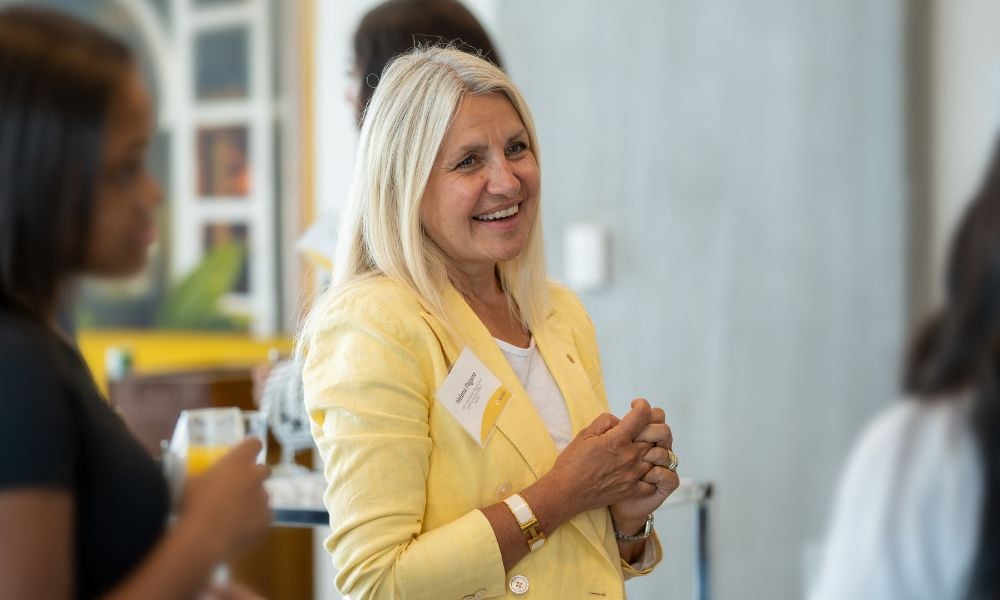
Helena Pagano sits down with HRD to chat 'employee centricity' and the future of HR in 2023

For Helena Pagano, chief people and culture officer at Sun Life, she feels like HR found her. After graduating with a business degree from the Toronto Metropolitan University, she fell into HR by accident – but soon found everything she was looking for in a career.
“HR was like a perfect amalgamation of everything I loved in the business world. Everything from strategy to navigating outcomes and helping people thrive – it was all the bits I loved.”
This foray into HR began at TD Canada Trust as assistant vice president of compensation. From there, Pagano soon progressed to the Royal Bank of Canada and finally Sun Life. She was drawn to Sun Life because of their unique desire to evolve from a traditional insurance brand to a thriving asset management business, focused on achieving digital growth. It’s this passion for evolving and transformation that Pagano’s team is focused on.
Read more: Is it time for small businesses to adopt corporate tactics?
“Our HR team is exceptional,” she says. “They have expertise in what the heart of HR really is - a deep understanding of people, of their motivations, and helping organizations achieve business goals. On my team, we focus on bringing technology to into HR, fuelling that great intentionality of people insights with more data.”
This focus on data as a core component of HR gained traction after the pandemic. COVID acted as a catalyst for organizational change and the adoption of new technologies. Data from SHRM found that 96% of HR leaders believe that they’ve effectively handled new ways of working since the pandemic – with 79% adding that they now have the technology to navigate the changing employment landscape moving forward. With the C-suite now firmly onboard with HR investments, people managers have the power to push through new, innovative, management tools in 2023.
And At Sun Life, the pandemic only accelerated aspects and components of HR that were years in the pipeline.
“We were already focused on a broader definition of wellness in mental health,” says Pagano. “Prior to the pandemic, we were thinking about how the future of work was going to change because of digital transformation. And then the pandemic came along and just pushed everything forward. It was such a time of pivoting decisions and reacting and helping people deal with the stress of responding to the pandemic - both personally and from a business perspective. That focus we'd started to have on mental health just amplified in importance because people were going through a tremendously stressful time.”
For many people leaders, they cited the pandemic as the most stressful time in their careers. The issue for HR became, “how do I lead when I’m feeling stresses and demotivated too?”. The mounting uncertainty compounded by a culture of overwork and eventual burnout led to a culture crisis – one which inevitably fed into the ongoing Great Resignation. One way many empathetic leaders chose to offset this was by leading through trust, open, and honesty.
Read more: Hybrid work: How to engage a multi-generational workforce
Speaking to Dr Nick Hobson, chief behavioural scientist at Emotive Technologies, he revealed that one way designing a more positive employee experience begins with leadership vulnerability.
“If a leader comes and says: ‘Look, I've had a terrible time. This has been hard for me. My kids have been home from day care and have been screaming in the background. It's been really tough. I've been of scared. I've been worried’ this makes a huge difference in helping your teams open up. Relating to your people on that on that human level makes them feel empowered and safe in sharing their own experiences with you.”
It's this culture of transparency that has seen compassionate leaders thrive whilst ‘archaic’ models have dwindled – something that will only continue to play out in the remaining 2022 months.
As we move from a reactive to a revolutionary phase in HR, employers are curious about the future. Organizations and their people are adapting to a whole new working world – one in which Pagano believes HR should be focusing on employee experience (EX).
“I’d really put employee centricity front and centre. There’s a focus on managing wellbeing in an environment where work has changed – where flexibility and hybrid models are key. How leaders manage this will be instrumental in how they fare in the coming months. It’s about understanding what your people want and how you can help them achieve that – whether that’s looking at how you work or where.”
Pagano also touched on the importance of understanding your organization’s real values. With work-life bleeding into personal time, leaders have to work harder than ever to ensure their culture is as empathetic as possible.
“We see loss of reduction of happiness in Gallup research,” Pagano says. “It's a time of divide. This is an important time for organizations to create that coalescing, positivity around culture, purpose, and values. That’s not going to go away. And I would put career at the heart of this. People want to feel like they're achieving their best in their careers. They want know how to navigate through work whilst also doing their best work - this gives people real purpose and meaning to their days.”
“We think about future of work as a core component. It's not only the people and the work, it's also the construct of how we do our work – how the office is designed to meet that employee experience.”